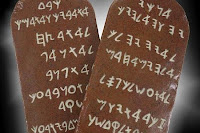Philippians 3: 12 -16 (NIV): I press
on to take hold of that for which Christ Jesus took hold of me.
Brothers, I do not consider myself yet to have taken hold of it. But
one thing I do: Forgetting what is behind and straining toward what
is ahead, I press on toward the goal to win the prize for which God
has called me heavenward in Christ Jesus. All of us who are mature
should take such a view of things. And if on some point you think
differently, that too God will make clear to you. Only let us live up
to what we have already attained.
It's a brand
new year and a good time to stop and reflect that the past is gone.
We can't go back and we can't change what happened yesterday. We have
to live in the present. I often say we don't live one day at a time,
but one moment at a time. We have this moment and nothing
else. The past is gone and the future arrives one second at a time
and no faster, and we do not know what it will bring. We do not fear
it because we know that God is already there waiting for us, but we
are wise not to count on it to make changes or to make our peace with
him. This moment is the one for that.
Paul knew he
wasn't perfect – and he knew he never would be, but his goal was
simple: to become more and more like Christ every day. That should be
our goal, too, every moment of this new year. We can't go back and
fix mistakes, but we can use our experiences and God's grace to avoid
new ones today. We can't go back and erase pain, but we can lean on
God for his comfort right now.
Paul says he
is forgetting what was behind and straining forward like a runner in
a race. Not looking back but putting one foot in front of the other
as he pushed ahead. We too are running the race set before us. We
strain ahead. We push forward. Sometimes it seems we cannot go any
more. Sometimes our faith is weak and our strength has dried up. But
we call on God and his bottomless power and we take one more step. We
strain ahead. We march forward. We run the race.
And we live up
to the maturity level we have reached. We do not backslide or waver
in our faith, but continually move forward. Not a year at a time or
even a day at a time, but moment by moment.





















